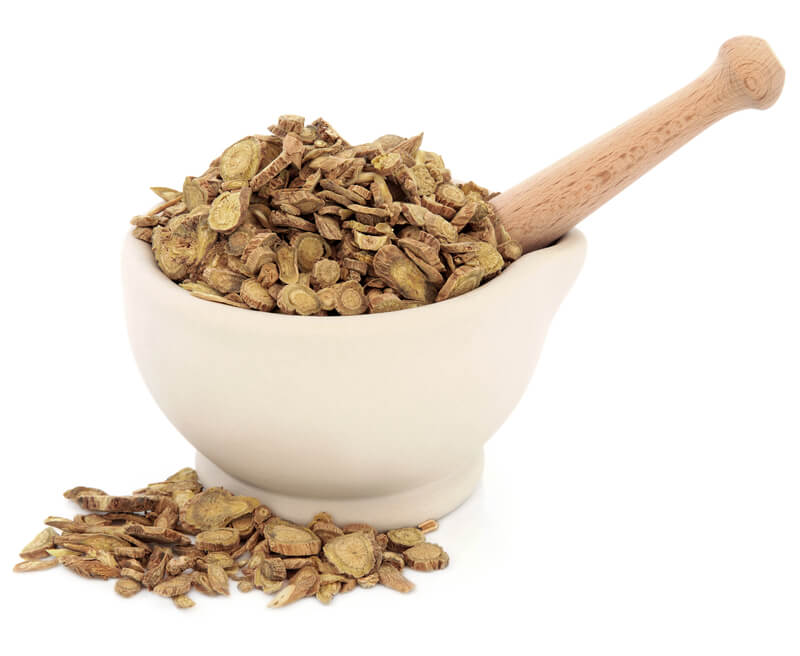When you hear “take some skullcap” you might think about taking a small hat worn close to the head somewhere.
They might be talking about the hat, but they could also be talking about a herb. You’ll want to ask a few questions to be sure.

Belonging to the mint family, this herb boasts distinctive blue or purple flowers catching the eye. Its two main varieties, Chinese and American, share similar properties but differ in their origins. No matter which one you choose, both have potential health benefits.
Skullcap has long been hailed as a powerful herb with various applications. From calming nerves to reducing inflammation, it has found its place in many holistic practices. What makes this herb special?
It’s all about the unique compounds it contains.
Health benefits of skullcap
Reducing anxiety and promoting relaxation
One of the potential health benefits of skullcap is its ability to help reduce anxiety and promote relaxation. Many people struggle with stress and anxiety. This can affect someone’s ability to sleep. Finding natural remedies can be beneficial for overall well-being. Skullcap has been used in traditional medicine for centuries as a natural remedy for anxiety.
Research suggests certain compounds found in skullcap, such as flavonoids and terpenoids, may have a calming effect on the nervous system. These compounds interact with receptors in the brain regulating mood and emotions, alleviating anxiety symptoms. By promoting relaxation, skullcap may also aid in improving sleep quality often disrupted by anxious thoughts.
Skullcap is also believed to have anti-inflammatory effects.
Anti-inflammatory
Skullcap has been studied for its anti-inflammatory properties. Inflammation is a natural response by the body’s immune system when it detects injury or infection. Chronic ongoing inflammation, however, can contribute to various health issues such as heart disease, diabetes, and autoimmune disorders.
Certain compounds present in skullcap, including baicalin and wogonin, have shown promising anti-inflammatory effects in laboratory studies. These compounds inhibit the production of pro-inflammatory molecules within the body’s cells, helping to reduce inflammation.
Neuroprotective effects
Another area of interest regarding skullcap is its potential to protect neurons in the brain. The brain is a complex organ responsible for numerous functions within the body. Protecting its health is crucial for overall well-being.
Studies conducted on animals have indicated compounds present in skullcap, such as baicalin and scutellarin, may have neuroprotective properties. These compounds have antioxidant and anti-inflammatory effects that can help protect brain cells from damage caused by inflammation.
Skullcap in natural health
Natural remedy for insomnia

Skullcap has been recognized for its potential as a natural remedy for insomnia and sleep disorders. When you find yourself tossing and turning, unable to find restful sleep, this herb may be the solution you’ve been searching for. With its calming properties, skullcap can help soothe your mind and relax your body, paving the way to a peaceful slumber.
Whether brewed into a comforting tea or taken as a supplement, skullcap acts as a gentle sedative that promotes relaxation. Sip on a warm cup of skullcap tea before bedtime to unwind after a long day. The soothing effects will gradually envelop you, easing away any anxiety or restlessness that may be keeping you awake.
If you prefer supplements, choose from various forms such as capsules or tinctures that contain concentrated doses of this beneficial herb.
Herbal adaptogen for stress
In our fast-paced modern lives, stress has become an all-too-familiar companion. This is where skullcap shines as an adaptogen, helping the body cope with stress. Acting as a natural stress reliever, it supports the body’s ability to adapt and respond to challenging situations.
When stress levels rise, our bodies release hormones like cortisol that can have detrimental effects on our well-being if unchecked. Skullcap helps regulate hormone levels and balance within the body. It aids in reducing anxiety symptoms associated with chronic stress.
Recommended dosage and safety considerations
Dosage varies depending on the form
It’s important to understand dosage can vary depending on the form. Skullcap is available in various forms such as capsules, tinctures, teas, and extracts. Each form may have different concentrations of active compounds.
For example, if you are using skullcap in capsule form, the recommended dosage may be different compared to consuming it as a tea. Read the instructions provided by the manufacturer or consult a healthcare professional for guidance on proper dosing.
Follow recommended guidelines and consult a healthcare professional before use
To ensure your safety when using skullcap herb, it is highly advisable to follow the recommended guidelines and consult with a healthcare professional before incorporating it into your routine. While herbal remedies can offer potential health benefits, they should be used with caution and under proper supervision.
Skullcap is well-tolerated when consumed within appropriate dosages. Individual responses may vary.
Pregnant women should avoid using skullcap due to limited safety data
It’s important to note there is limited safety data available regarding the use of skullcap during pregnancy.
Side effects of consuming skullcap
It’s generally considered safe for most people when used appropriately. However, as with any herbal remedy or supplement, there can be some mild side effects individuals may experience.
One common side effect is drowsiness. Some individuals may feel a bit sleepy or lethargic after taking this herb.
Another potential side effect is dizziness. This can occur in some individuals, especially those who are more susceptible to changes in blood pressure or have low blood pressure. If you experience dizziness after consuming skullcap herb, sit or lie down until the sensation passes.
Allergic reactions are rare but possible
In rare cases, allergic reactions to skullcap may occur, particularly in individuals who are allergic to other plants in the mint family. The mint family includes various herbs such as basil, oregano, and lavender. If you have known allergies to these plants, it would be wise to exercise caution when considering the use of skullcap herb.
Allergic reactions can manifest as skin rashes, itching, hives, swelling of the face or throat, and difficulty breathing. If you experience any of these symptoms after consuming skullcap herb, it is crucial to seek immediate medical attention.
Mechanism of liver injury from skullcap
Rare cases of liver injury from skullcap
Liver injury associated with the use of skullcap supplements has been reported in rare cases. These instances usually occur when individuals consume high doses or use it for an extended period.
Understanding liver injury
How skullcap can cause liver injury is not yet fully understood. Hepatotoxicity may be responsible for these adverse effects. Hepatotoxicity refers to any damage caused to the liver due to exposure to some substance.
In some cases, individuals using skullcap have experienced apparent liver injury, leading to conditions like hepatitis or even liver failure. Apparent liver injury refers to a condition where there is evidence of liver damage without any other known causes.
Prolonged use or consumption of high doses of skullcap supplements appears to be a common factor in reported cases of liver injury. While moderate and occasional consumption may not pose significant risks, exceeding recommended dosages or using the herb continuously for an extended period can potentially harm the liver.
Overdosing
Taking excessive amounts of skullcap can have serious consequences on the body. It is important to be aware of the potential side effects and symptoms arising from an overdose. If you suspect you or someone else has overdosed on skullcap, seek immediate medical attention.
There are several symptoms that may manifest. These symptoms can vary in severity and may include confusion, tremors, and an irregular heartbeat. Experiencing these effects can be distressing and alarming, making it essential to address the situation promptly.
Overdosing on skullcap can also lead to oxidative stress in the body. This occurs when there is an imbalance between harmful free radicals and antioxidants in our system. Oxidative stress can contribute to various health issues, including anxiety disorders, sleep disorders, and increased susceptibility to certain conditions.
Sources of Skullcap: What to Look For
Available Forms
Skullcap can be found in various forms like dried leaves, extracts, tinctures, and capsules. Dried leaves are a popular choice for those who enjoy making their own herbal teas or infusions. They provide a convenient way to incorporate skullcap into your daily routine. On the other hand, extracts and tinctures offer a concentrated form of the herb, allowing for easy and precise dosage. Capsules are another convenient option for those looking for a quick and hassle-free way to consume skullcap.
Contaminant-Free Products
To ensure your safety when using skullcap, it is important to look for products free from contaminants. Third-party testing plays a vital role in verifying the purity of herbal supplements. Make sure the product you choose has undergone rigorous testing by an independent laboratory to confirm its quality and purity. This testing should include screening for heavy metals, pesticides, microbial contaminants, and any other potential impurities.
Third-Party Testing
Third-party testing is an essential aspect when choosing products. It provides an unbiased evaluation of the product’s quality and ensures transparency between manufacturers and consumers. Look for companies that openly share their test results, indicating the absence of contaminants and verifying the potency of their products.
By relying on third-party testing, you can have confidence in the quality and purity of the skullcap herb you purchase. It offers reassurance the product has been thoroughly examined by an independent laboratory, providing reliable information about its composition and safety.
Traditional uses and research on skullcap
Traditional Uses
Skullcap, a staple in traditional Chinese medicine, has been used for centuries to address a variety of health concerns. Native Americans also recognized its medicinal properties and used it in their healing practices. Here are some of the traditional uses:
-
Insomnia: Skullcap has long been employed as a natural remedy for sleep disorders. Its calming properties help relax the mind and promote restful sleep. Whether consumed as an herbal tea or taken in supplement form, skullcap can be an effective aid for those struggling with insomnia.
-
Anxiety: Skullcap is renowned for its anxiolytic effects, making it a popular choice for individuals dealing with anxiety disorders or excessive stress. It helps soothe nervous tension and promotes relaxation without causing drowsiness or impairing cognitive function.
-
Inflammation: The anti-inflammatory properties of skullcap have made it valuable in addressing various inflammatory conditions such as arthritis and joint pain. By reducing inflammation, skullcap can alleviate discomfort and improve overall well-being.
Research on Skullcap
While traditional use provides valuable insights into the potential benefits of skullcap herb, modern scientific research aims to explore its therapeutic applications further. Here’s a glimpse into some areas where researchers are focusing their efforts:
-
Neurological Disorders: Preliminary studies suggest compounds found in skullcap may hold promise for neurological disorders like Alzheimer’s disease and Parkinson’s disease. These compounds exhibit neuroprotective effects that could potentially slow down the progression of these conditions or alleviate symptoms.
-
Cancer Treatment: Researchers are investigating potential anticancer properties of skullcap due to its high content of flavonoids and other bioactive compounds. Some studies indicate these substances possess anti-tumor effects and could inhibit cancer cell growth.
-
Anti-Anxiety and Antidepressant Effects: Beyond its traditional use for anxiety, skullcap is being studied for its potential as a natural alternative to conventional medications for anxiety disorders and depression. Early research suggests skullcap may influence neurotransmitters in the brain, promoting a sense of calm and emotional well-being.
-
Anti-Inflammatory Properties: Scientific studies have confirmed the anti-inflammatory effects of skullcap, supporting its traditional use as an herbal remedy for inflammatory conditions. By targeting inflammation at a cellular level, skullcap could offer new possibilities for managing chronic inflammatory diseases.
FAQs:
Q: Can I use skullcap herb for inflammation?
A: Yes! Skullcap herb has anti-inflammatory properties that may help reduce inflammation in the body when used appropriately.
Q: Does skullcap herb have any proven anti-cancer effects?
A: Some research suggests compounds found in skullcap exhibit anticancer properties.
Q: Is there a recommended dosage for consuming skullcap herb?
A: While there is no established standard dosage for skullcap herb, it is advisable to start with small amounts and gradually increase as tolerated. Consulting with a healthcare professional or herbalist can provide personalized dosage recommendations.
Q: Are there any known side effects of consuming skullcap herb?
A: Skullcap is generally safe when used in moderation. However, excessive consumption may lead to adverse effects such as liver injury. It is crucial to follow recommended dosages and consult a healthcare professional if you experience any concerning symptoms.
Also on the blog:
